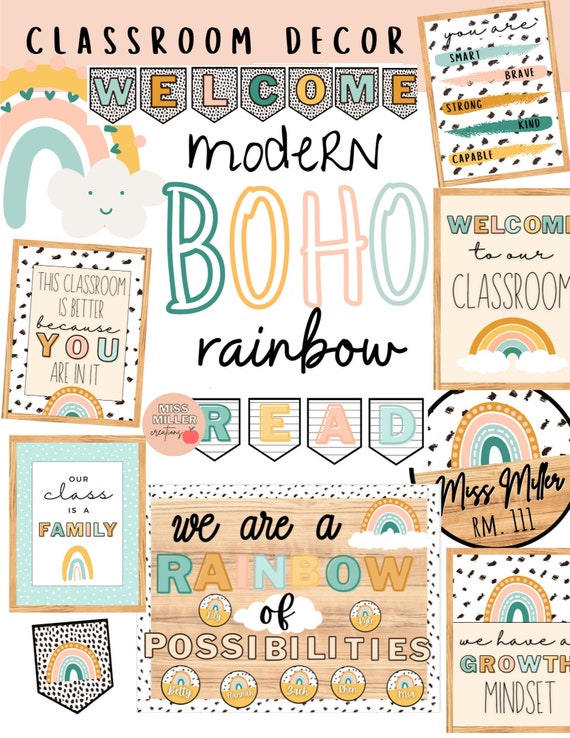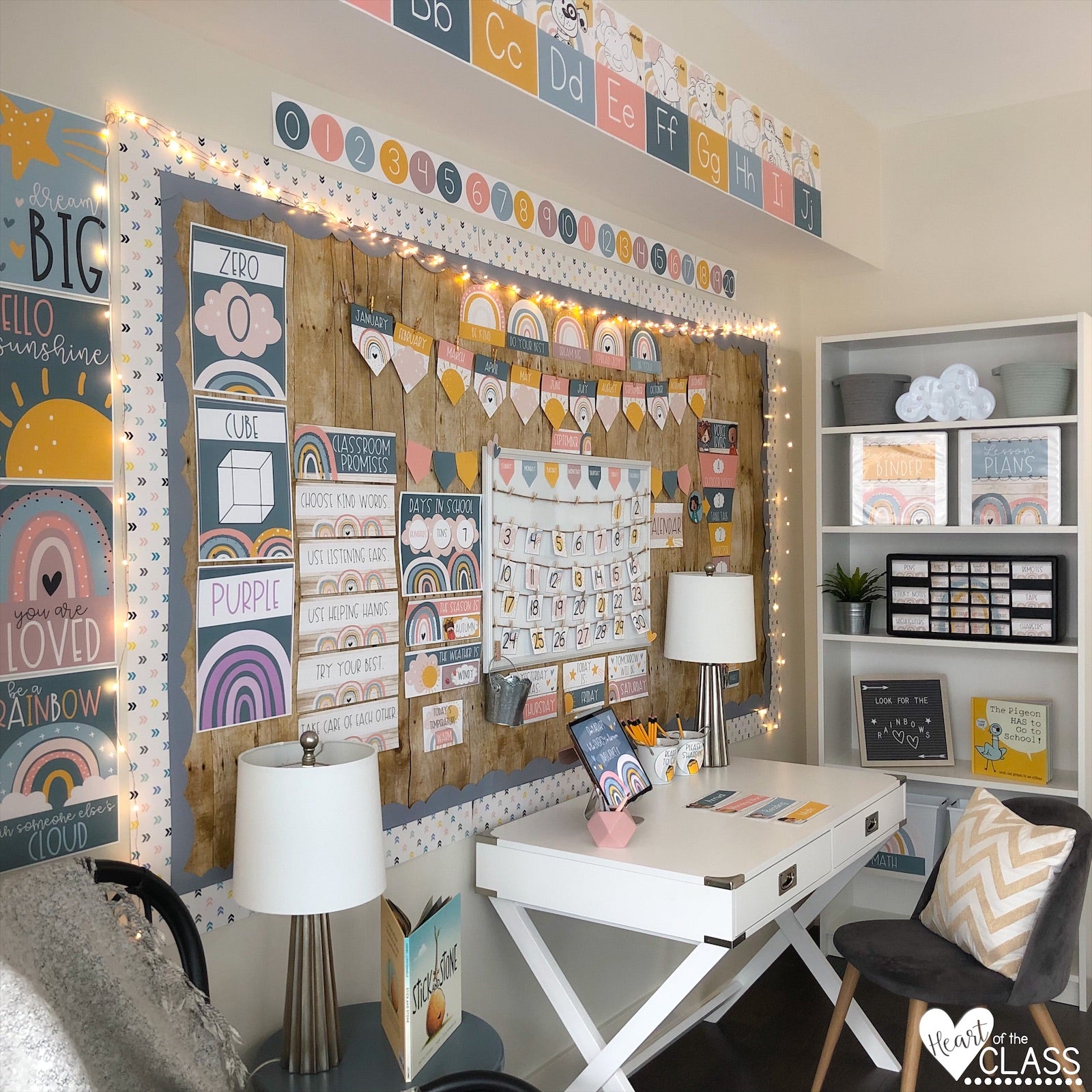In the world of education, the environment plays a crucial role in shaping students’ experiences. Good classroom design not only enhances creativity but also fosters a sense of belonging and comfort. Having spent years working in various classroom settings, I can confidently say that the modern boho classroom decor style beautifully intertwines whimsy with a calming atmosphere, making it perfect for teaching and learning.
What Is Modern Boho Classroom Decor?
The modern bohemian (boho) style is characterized by a relaxed yet vibrant aesthetic. It embraces natural elements, rich colors, and eclectic designs. In a classroom setting, this style creates an inviting space that can enhance student engagement and inspiration.
Essential Elements of Modern Boho Decor
- Natural Materials: Incorporate wood, cotton, and rattan to give a warm, earthy feel.
- Textured Fabrics: Use cushions, rugs, and wall hangings that add depth and interest.
- Plants: Adding greenery not only purifies the air but also connects the space with nature.
- Warm Colors: Opt for warm neutrals, earthy tones, and pops of vibrant colors to create a harmonious balance.
- Personal Touches: Include handmade items or local artwork to give the space character.
Why Choose Bohemian Decor for Classrooms?
Choosing bohemian decor for your classroom offers numerous benefits:
Benefits of Bohemian Decor
| Benefit | Description |
|---|---|
| Fosters Creativity | The eclectic mix of decor can inspire students to think outside the box. |
| Enhances Comfort | A relaxed atmosphere encourages students to feel at ease, making learning more enjoyable. |
| Promotes Individuality | Boho decor often celebrates uniqueness, encouraging students to express themselves. |
| Environmentally Friendly | Many boho elements are sourced from natural and sustainable materials. |
Designing Your Boho Classroom
Now that we understand the benefits, let’s delve into practical steps for designing your modern boho classroom.
Step 1: Choose a Color Palette
Select a color scheme that reflects bohemian vibes. Common palettes include:
- Earthy tones: Terracotta, olive green, and burnt sienna.
- Warm Neutrals: Cream, taupe, and beige to create a cozy base.
- Accent Colors: Deep indigo, mustard yellow, or rust for pops of color.
Step 2: Select Furniture Wisely
Furniture is essential in a classroom setting. Here are some tips:
- Multi-functional Furniture: Look for tables that can be adjusted or rearranged easily.
- Comfortable Seating: Bean bags, floor cushions, or low seating options can create a relaxed atmosphere.

Step 3: Add Textiles and Patterns
Textiles can add warmth and comfort. Consider these:
- Area Rugs: Choose patterned rugs that can define different areas of the classroom.
- Wall Hangings: Macramé or woven wall hangings could add personality and texture.
Step 4: Incorporate Greenery
Plants bring life to your classroom. Low-maintenance options, such as succulents or snake plants, are perfect for busy educators.

Step 5: Personalize the Space
Encourage students to contribute to the decor. This could be through artwork, project displays, or collaborative projects that reflect the class’s identity.
Comparing Boho Decor Styles
While modern boho is a wonderful choice, it’s helpful to compare it with other styles to ensure it’s the right fit for you.

| Decor Style | Characteristics | Ideal Classroom Vibe |
|---|---|---|
| Modern Boho | Eclectic, warm, and inviting with natural materials. | Creative and relaxed. |
| Minimalist | Simple, clean lines, and functional. | Calming and uncluttered. |
| Industrial | Raw materials, neutral colors, and over-sized furniture. | Edgy and contemporary. |
| Traditional | Classic furniture, rich colors, and ornate designs. | Formal and classic. |
Pros and Cons of Modern Boho Classroom Decor
Before diving into this style, it’s important to consider its pros and cons:

Pros
- Inviting and warm atmosphere.
- Encourages creativity among students.
- Flexible and easy to personalize.
- Promotes a connection to nature.
Cons
- May require more time and effort to curate.
- Risk of becoming cluttered if not managed well.
- Potentially higher costs if using unique or artisanal items.

Real-Life Classroom Examples
My own experience has shown the effectiveness of bohemian decor in classrooms. Here are a couple of examples:
Example 1: The Art Room
In an art room I once designed, the walls were adorned with student artwork and colorful textiles. Large floor cushions created a relaxed space for students to collaborate or seek inspiration. The use of plants brought freshness into the room, creating a truly vibrant environment.

Example 2: The Reading Nook
Another classroom featured a cozy reading nook filled with a diversity of cushions and a low wooden table. The walls were decorated with inspiring quotes and student-made artifacts. This dedicated space not only promoted reading but also encouraged students to engage with their surroundings.
Tips for Maintaining Your Boho Classroom Decor
Once you have set up your modern boho classroom, maintaining it effectively is crucial:
Regularly Update Decor
Change decor seasonally or when new projects are completed to keep things fresh.
Involve Students
Encourage students to take part in decorating the space. This fosters ownership and pride in their environment.
Keep it Organized
Utilize storage solutions that compliment the decor to maintain a tidy space.
Frequently Asked Questions (FAQs)
What colors are best for bohemian classroom decor?
Warm-neutral colors, earthy tones, and accents of bright colors are ideal for creating a boho atmosphere.
How do I incorporate plants without making maintenance difficult?
Choose low-maintenance plants, such as succulents or pothos, and group them for efficient care.
Can I mix bohemian decor with other styles?
Absolutely! Mixing styles can create a unique environment, just ensure it remains cohesive and balanced.
Are there budget-friendly options for bohemian decor?
Yes! Thrift stores, DIY projects, and incorporating student art can help you decorate on a budget.
Conclusion
Embracing modern boho classroom decor can profoundly affect your teaching environment. It’s not only about aesthetics; it’s about creating a space where students feel inspired, comfortable, and engaged. Remember to incorporate your personal style and adapt the designs according to your students’ needs. Happy decorating!